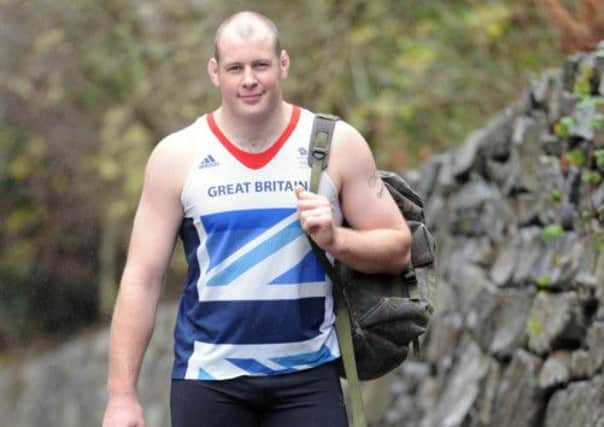Commonwealth Games: Judo hero on road to fitness


During his judo career the 29-year-old has notched up a long list of injuries with operations needed on his shoulders (two on his right, one on his left), knee, ankle and hernia, plus numerous dislocations.
“My fingers have been dislocated multiple times. They are pretty bumpy,” he said with a grin.
Advertisement
Hide AdAdvertisement
Hide AdThese are minor injuries for a heavyweight judoka. Of greater concern is returning to full fitness in time to qualify for the Glasgow Games.
“The main injuries come big and, unfortunately, usually puts you out of training. All the time that you are out of your sport you are falling behind everyone else. So, the quicker and better the systems are to recover you, the quicker you can get back into your game,” he said.
Sherrington, from Wigan in Lancashire, has lived in Scotland for almost 10 years and hopes to represent Scotland at the Games next year.
He only started training at elite level when he was 21, after returning from Iraq as part of the initial invasion in 2003.
He described himself as “stressed and out of character” when he came back and needed something new to focus on.
After 12 months he was ranked third in Britain and a year later became the number one heavyweight judoka in the country.
Surgery
He made headlines at London 2012 by disposing of his first competitor in under 25 seconds. But he was put out in the next round by three-time world champion Alexander Mikhaylin from Russia.
Almost three weeks after surgery on his left ankle Sherrington is having daily therapy with Oliver Davies, lead physiotherapist for judo, at the sport’s National Training Centre in Ratho, near Edinburgh.
Advertisement
Hide AdAdvertisement
Hide AdMonitoring his progress is Fiona Mather, head of physiotherapy at the sportscotland Institute of Sport. She explained the importance of sport-specific physiotherapy while Chris recreated judo moves with Oliver.
“Most importantly([he is) mentally getting his brain thinking about judo which is a fantastic form of rehab, actually using your limbs in the way that you would in your sport, which is why we are able to rehabilitate (athletes) at an accelerated pace,” she said.
“We can’t speed up healing but we can give it the best environment in which to heal and make that very sport-specific, and that’s very important. Commonly, athletes that don’t have this sort of intervention can very quickly re-injure when they do go back because they are not fully rehabilitated.”
Physiotherapists make up one element of the team working with Chris and all the athletes supported by the institute.
Understanding
Since 1998 the institute has been working with high-performance athletes as they train to reach their peak.
Susie Elms is head of performance lifestyle at the institute, where they make sure the athlete’s personal life is linked to their training and preparation using psychology, nutrition, physiotherapy and sports medicine.
“It’s important that there’s not one discipline doing one thing without speaking to the others. There needs to be an understanding of who the athlete is, the direction they are going in, the set of circumstances they are in and ensuring that the right support services are in place for that athlete.
“The Chris Hoys, the Kath Graingers are phenomenal athletes but they are human beings with exactly the same feelings that everybody else will have. Part of the role that performance lifestyle has within that is understanding that and bringing that picture to the science table to develop the best package to put round an individual to enable them to perform at the highest level.
Advertisement
Hide AdAdvertisement
Hide Ad“Going into the Commonwealth Games, every athlete involved in this selection window will want to be at their absolute best and, therefore, they will be looking at all elements of themselves to make sure they get it right on the day.”
Sherrington said he is taking advantage of all expertise on offer in the run-up to Glasgow 2014.
“There’s only one thing I’m hoping for in Glasgow and that’s the gold medal. I wouldn’t settle for anything else. Anything else is a failure,” he said.